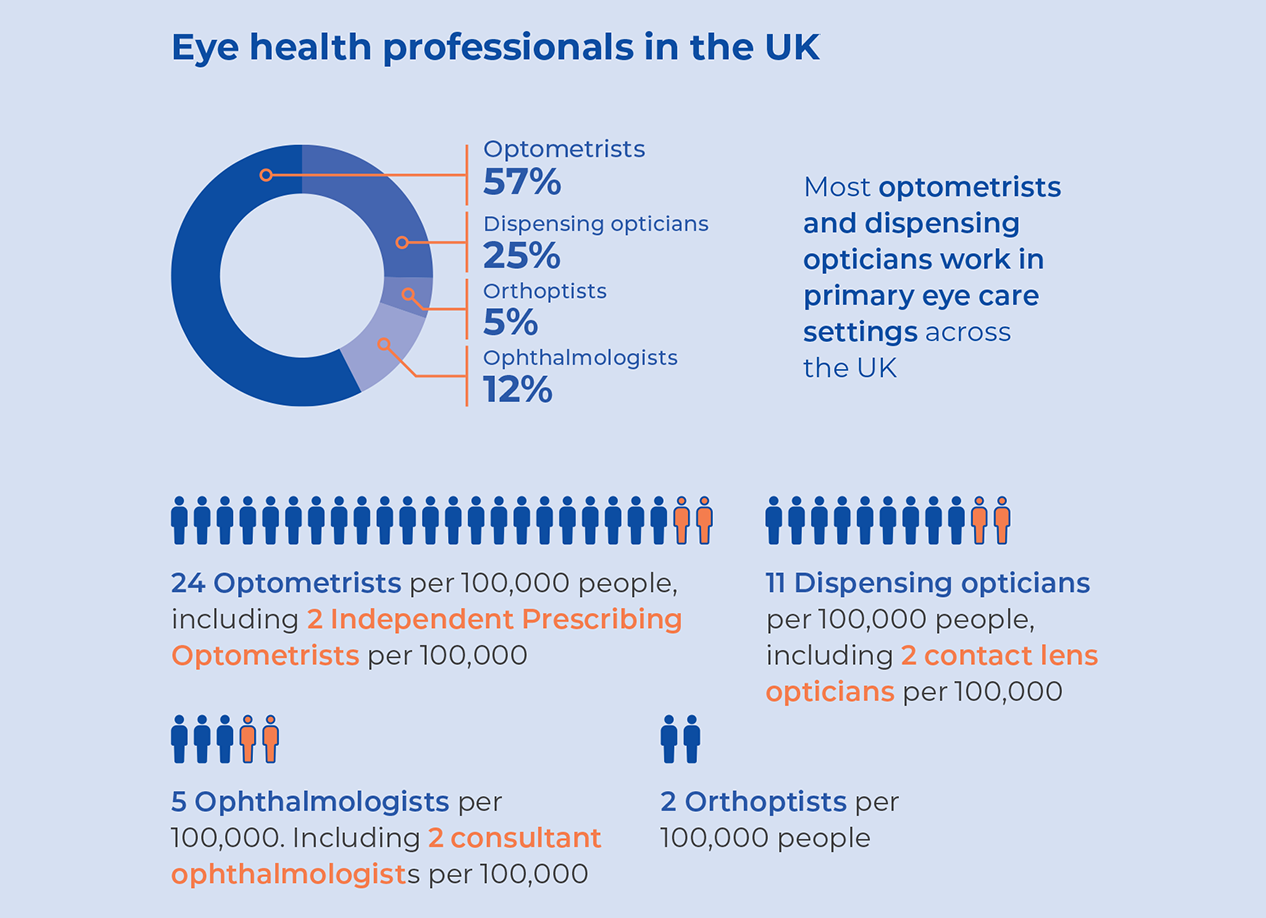- Primary eye care in England provides more than 23.6 million appointments each year, including sight tests, enhanced eye care services and contact lens care appointments [1]
- Secondary care provides about 8 million appointments, supporting 3.2 million patients each year [2].
In England, the NHS sets out who is eligible for an NHS-funded eye examination and help towards the cost of prescription glasses. This eye examination is provided based on a national contract for General Ophthalmic Services (GOS). The GOS fee is negotiated annually by the Optometric Fees Negotiating Committee (OFNC).
All other adults must pay for a private eye examination and do not get any help from the NHS towards the cost of prescription glasses (unless their financial circumstances change).
NHS commissioners also work with Local Optical Committees (LOCs) and the LOC Support Unit (LOCSU) to commission enhanced services from community based practices. This allows people to access more timely care closer to home.
NHS commissioners fund the Hospital Eye Service (HES).
NHS care is currently commissioned by Integrated Care Boards (ICBs), which must comply with the Provider Selection Regime (PSR). Compliance includes following PSR statutory guidance Annex C, which sets out in detail how to commission primary ophthalmic services (POS).
The Clinical Council for Eye Health Commissioning (CCEHC) is an advisory body to NHS England. It brings together experts in their field with the aim of providing evidence-based guidance to support NHS commissioners and achieve the best possible outcomes for patients and the wider NHS.
FODO members provide most primary eye care services in England. FODO has a seat on the CCEHC and is a founding member of LOCSU and a member of the OFNC.
Eye care workforce
Optometrists and dispensing opticians comprise the largest regulated workforce in eye care, followed by ophthalmologists and orthoptists.*

Primary care optometrists are also qualified to manage a large and complex caseload. The table below provides an overview of the competencies and qualifications of primary care optometrists.
The section below provides an overview of eye health professionals and how they are regulated.
Regulated by the General Optical Council. Optometrists perform detailed eye examinations to detect defects in vision, ocular disease or other health issues. Many now also perform advanced diagnostic tests and co-manage patients with eye conditions. They form the single largest group of eye care professionals in the UK.
Dispensing opticians
Regulated by the General Optical Council. Dispensing opticians can fit and supply spectacles to children and adults and can advise on and dispense low vision aids. With additional specialist training they can also fit contact lenses and examine the anterior eye for defects and ocular disease.
Orthoptists
Regulated by the Health and Care Professions Council. Orthoptists specialise in diagnosing and treating visual problems involving eye movements. They might have other roles and responsibilities. They typically work in hospital eye clinics but can also work in community settings - for example, when screening in schools.
Ophthalmologists
Regulated by the General Medical Council. Ophthalmologists are medically trained doctors who specialise in eye health. They often do a mix of surgical and non-surgical work, and as they build more experience they typically specialise in a specific sub-speciality, with Health Education England noting eight subspecialty areas in 2019
- Cornea and anterior segment
- Medical retina
- Glaucoma
- Oculoplastic surgery (plastic surgery around the eye)
- Paediatric ophthalmology
- Surgical retina (vitreo-retinal surgeons)
- Primary care
- Medical and neuro-ophthalmology.
References
[1] FODO, The future of primary eye care - principles and priorities https://www.fodo.com/flipbooks/FODO-Strategy-Document-Full-2023/. Each year practices in England provide more than 19.6 million sight tests, at least 650,000 enhanced eye care appointments and an estimated 3.36 million contact less appointments (based on 84% of contact lens users in the UK living in England and visiting at least once per year). Excluding visits for repeat tests and advanced diagnostics, a conservative estimate is that 23.6 million clinical appointments are offered each year.
[2] The Office for Health Improvement & Disparities Vision Profile, which includes ophthalmology outpatient data in England, shows an estimated 8 million ophthalmology appointments and an estimated 3.2 million patients are seen each year.
*This shows the current split of the workforce within the UK.


 Patients and public
Patients and public
 Policymakers
Policymakers Members
Members News and views
News and views

